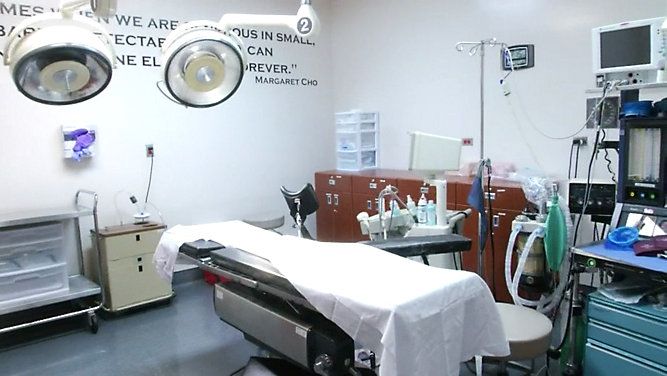AUSTIN, Texas — Legislation that would ban abortions after as early as six weeks — before many women know they are pregnant — and let virtually any private citizen sue abortion providers and others was given final approval by lawmakers last week and is headed to Gov. Greg Abbott, who has signaled he will sign it into law.
Senate Bill 8, a Republican priority measure, is similar to “heartbeat bills” passed in other states that have been mostly stopped by the courts. But proponents of the Texas legislation believe it’s structured in a way that makes it tougher to block.
The bill would not be enforced by public officials. Proponents hope that will prevent abortion rights advocates from suing the state to prevent the law from taking effect, though some legal experts have doubts about the strategy.
The anti-abortion Texas Right to Life organization, which supported the bill, said the would-be law lets citizens hold abortion providers “accountable through private lawsuits,” which has not been tried in any other state.
A spokesperson for the organization called it “the strongest Pro-Life bill passed by the Legislature since Roe v. Wade.”
Three separate anti-abortion organizations were contacted but didn't return calls or emails for this story, including Texas Right to Life Committee, and ProLife Across America.
The enforcement provisions is what make the legislation unique. Everywhere else, only a few public officials could prosecute this kind of law. This legislation goes much further by allowing any person other than a state or local official to sue an abortion provider or someone who “aids and abets” another person in obtaining an abortion, whether they were directly involved and whether they’re located in Texas.
In other words, if a Texan becomes pregnant as a result of rape and is provided information about how to obtain an abortion by a rape counselor, the rapist could sue that counselor if the survivor had what the state deems an “illegal” abortion. The rapist could also sue the doctor who provided the abortion and anyone else — like a family member — who supported them in getting the abortion.
Similarly, someone who provides funds for an abortion could be sued, even if they didn’t know that’s what the money was being used for. And since anyone who "intends to engage” in providing an outlawed abortion can also be held liable, opponents of the bill believe it’s possible to imagine that the rapist or other party could sue the provider in advance of the procedure to stop it from happening, denying the victim the ability to have the abortion.
More than 200 physicians including obstetrician gynecologists, family physicians, pediatricians, internists, emergency room physicians, psychiatrists, dermatologists and radiologists have signed an open letter to House Speaker Dade Phelan and members of the Texas House, expressing strong opposition to the measure.
“SB 8 would be catastrophic for both the patients I care for across Texas and for the dedicated physicians across our State,” said Dr. Ghazaleh Moayedi, a board certified OB/GYN. “No matter your personal opinions on abortion, we can all agree that Texas physicians should be able to provide accurate, non-biased medical information without threats or harassment from out-of-state extremists. A person’s unique health care needs, not politicians in Austin, should determine the health information and care they receive. People seeking abortion care are your neighbors and so are the physicians who provide that care.”
The cause of action, the physicians asserted in their letter, is so broad it would allow physicians, nurses, counselors, clinic staff, or family members of rape survivors to be sued by rapists and recover a minimum of $10,000 if successful. As currently constructed, the doctors say, the bill amounts to “intentional shaming and targeting of people who need and provide safe, essential abortion care.”
Opponents of SB 8 believe, if signed into law, it might also prevent physicians from providing information on all pregnancy options to patients out of fear of being sued.
SB 8 is the first of its kind in the country and unique because of the private cause of action. Similar bills have been proposed in 12 other states, but none are currently in effect because of litigation.
Critics say the language of SB 8 is written so broadly that the private cause of action could apply to all medical specialties, regardless of the type of medical care provided. This could include pediatrics, primary care, emergency medicine, obstetrics and gynecology, surgery and internal medicine, to name just a few. It would impact all types of health care facilities, from private practices to community health centers and hospitals, observers believe.
The physicians believe Texas is about to pass a law that not only violates the U.S. Constitution as determined by Roe v. Wade, but one that would also change the very nature of enforcing laws — shifting them from state officials to private citizens.
“When it comes to health care decisions, including abortion care, providers should be able to provide their patients information about all options, so that they can choose for themselves what is best for them and their futures,” said Dr. Joe Nelson, a Texas family physician. “SB 8 is clearly designed to invite harassing and frivolous lawsuits against anyone willing to help someone with an unwanted pregnancy and would effectively stop all health care workers from being able to give our patients accurate information about their reproductive health care options. Restricting abortion does nothing but force patients to travel great distances to get the help they need if they are able to obtain the financial resources and social support to do so, which we know is already increasingly difficult as we continue to face the challenges of the pandemic.”



